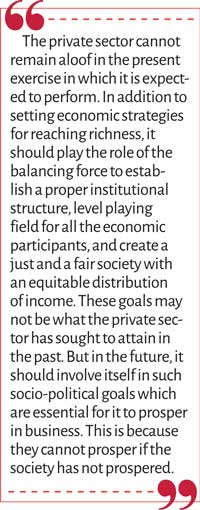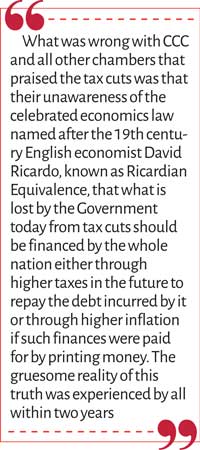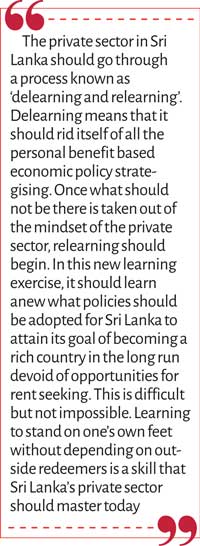Monday Feb 16, 2026
Monday Feb 16, 2026
Monday, 7 August 2023 00:10 - - {{hitsCtrl.values.hits}}

The private sector should be the leader and not a passive spectator
Social market economy policy and the middle path for development
 At the conclusion of the lecture series on macroeconomic trends at the Postgraduate Institute of Management, or PIM, for the students following the Executive Master of Business Administration Degree, a student made a fine suggestion about the role of the private sector. One of the topics covered in the course was President Ranil Wickremesinghe’s plan to deliver richness to Sri Lankans by 2048 when the country will be celebrating the centenary of independence from Britain.
At the conclusion of the lecture series on macroeconomic trends at the Postgraduate Institute of Management, or PIM, for the students following the Executive Master of Business Administration Degree, a student made a fine suggestion about the role of the private sector. One of the topics covered in the course was President Ranil Wickremesinghe’s plan to deliver richness to Sri Lankans by 2048 when the country will be celebrating the centenary of independence from Britain.
Wickremesinghe had revealed his strategy of adopting Lab Approach, a technique of economic policy strategising developed by the Growth Lab of Harvard University’s Centre for International Development or CID headed by economist Ricardo Hausmann, a former Minister of Planning in Venezuela. Wickremesinghe said that he will be assembling the bigwigs of the private sector, Government, and the Cabinet in a policy retreat for six weeks to design the development strategy to be followed by Sri Lanka in the next 25 years to make it a rich country by 2048. These three groups will be discussing, debating, and framing the detailed policy action to be taken based on the four pillars of policy strategy he had announced, namely, disciplining the budget, investment promotion, social safety net provision, and finally, reforming the state-owned enterprises.
All these will be done in a framework of following the social market economy policy, an ideology he had adopted when he took the reins of the Government in 2015 as its Prime Minister but ignored during the currency of his premiership. This ideological approach, pursued by the post-war Germany as its economic policy base recognises the key role played by the private sector in economic advancement but subject to guidance of the Government which will ensure social justice to people in economic development. It is, therefore, the middle path between the extreme capitalism and extreme socialism. It is not a new ideology for Sri Lanka as the Sri Lanka Freedom Party founded by the late S.W.R.D. Bandaranaike believed in this middle path in its approach to social and economic advancement but lost during the time of his widow, the late Sirimavo Bandaranaike, when the system was converted to extreme statism especially during 1970-77.
Private sector serving on the lab experiment should be proactive
 The student in question suggested that since the private sector is the more important partner of development in this policy strategising, it should immediately set itself on doing its homework on policy strategy so that once it meets in the policy capsule with the other two partners, it can participate in the exercise as an informed partner and not as a blind follower. In other words, according to this student, the private sector should be the leader and not a passive spectator. She also suggested that this policy framework should be revealed by them to the people – the private sector proper at the national level – so that it can get feedback from those who matter in this joint exercise.
The student in question suggested that since the private sector is the more important partner of development in this policy strategising, it should immediately set itself on doing its homework on policy strategy so that once it meets in the policy capsule with the other two partners, it can participate in the exercise as an informed partner and not as a blind follower. In other words, according to this student, the private sector should be the leader and not a passive spectator. She also suggested that this policy framework should be revealed by them to the people – the private sector proper at the national level – so that it can get feedback from those who matter in this joint exercise.
This is important because whatever the policy being signed off, it will be implemented by the people at the national level and therefore, they should know what is waiting for them under the new growth objectives of the Government. This is in line with the democratic economic policy governance principles which are an integral part of the social market economy policy being pursued by the Wickremesinghe government. Hence, this student and other students who are backing her expect the private sector bigwigs to act responsibly considering the pathetic state of the economy and the painful decisions that must be taken to come out of the economic malaise.
Avoidance of rent seeking
 This student has a valid point. Sri Lanka’s private sector has never acted responsibly when it comes to making policy strategies for the long-term economic advancement of the country. That sector, like the private businessmen in other countries, is a gross rent seeker, a person who seeks to get personal benefits, in preference to all others in society, by manipulating the existing laws or twisting them in his favour. Consequently, for those rent seekers, any budget which cuts taxes for businesses and offers subsidies to organised corporate sector is a development-oriented budget. The reality that what is cut here or what is subsidised there should be financed by them in the long run is ignored in their pursuit for rent seeking.
This student has a valid point. Sri Lanka’s private sector has never acted responsibly when it comes to making policy strategies for the long-term economic advancement of the country. That sector, like the private businessmen in other countries, is a gross rent seeker, a person who seeks to get personal benefits, in preference to all others in society, by manipulating the existing laws or twisting them in his favour. Consequently, for those rent seekers, any budget which cuts taxes for businesses and offers subsidies to organised corporate sector is a development-oriented budget. The reality that what is cut here or what is subsidised there should be financed by them in the long run is ignored in their pursuit for rent seeking.
Sri Lanka’s largest and oldest chamber, Ceylon Chamber of Commerce, in a statement in 2019 praised Gotabaya Rajapaksa’s tax cuts that it will revive the economic growth and activity in the short run (see: https://economynext.com/sri-lankas-ceylon-chamber-optimistic-on-tax-cuts-34539/). This position was taken by CCC despite my warning simultaneously that Gota should withdraw this unsound policy before it will backfire and destroy the public finances of the country (available at: https://www.ft.lk/columns/Tax-cuts-Control-the-damage-before-the-unconventional-stimulus-backfires/4-691207).
What was wrong with CCC and all other chambers that praised the tax cuts was that their unawareness of the celebrated economics law named after the 19th century English economist David Ricardo, known as Ricardian Equivalence, that what is lost by the Government today from tax cuts should be financed by the whole nation either through higher taxes in the future to repay the debt incurred by it or through higher inflation if such finances were paid for by printing money. The gruesome reality of this truth was experienced by all within two years.
When Ranil Wickremesinghe reversed the earlier tax cuts by increasing the same substantially in late 2022, CCC in a statement said, while it understands the rationale for tax increases, the Government should show accountability in its finances (available at: https://lankanewsweb.net/archives/22007/ccc-insists-the-govt-to-show-accountability-on-spending-to-justify-tax-hike/). This fragile mentality of the private sector which is bent on rent seeking will be directly in clash with the type of economic reforms being suggested by Ranil Wickremesinghe government which is guided by IMF-World Bank type economic reforms. In these economic reforms, there is no opportunity for rent seeking.
Delearning and relearning
 The private sector in Sri Lanka should, therefore, go through a process known as ‘delearning and relearning’. Delearning means that it should rid itself of all the personal benefit based economic policy strategising. Once what should not be there is taken out of the mindset of the private sector, relearning should begin. In this new learning exercise, it should learn anew what policies should be adopted for Sri Lanka to attain its goal of becoming a rich country in the long run devoid of opportunities for rent seeking. This is difficult but not impossible. Learning to stand on one’s own feet without depending on outside redeemers is a skill that Sri Lanka’s private sector should master today.
The private sector in Sri Lanka should, therefore, go through a process known as ‘delearning and relearning’. Delearning means that it should rid itself of all the personal benefit based economic policy strategising. Once what should not be there is taken out of the mindset of the private sector, relearning should begin. In this new learning exercise, it should learn anew what policies should be adopted for Sri Lanka to attain its goal of becoming a rich country in the long run devoid of opportunities for rent seeking. This is difficult but not impossible. Learning to stand on one’s own feet without depending on outside redeemers is a skill that Sri Lanka’s private sector should master today.
When a group of French businessmen met the Controller General of Finances in France, Jean Baptiste Colbert in 1681, the latter is said to have asked the businessmen what the government should do to help them. It is reported that the leader of the group, Le Gendre, had quipped ‘Laissez-nous faire’ or ‘leave it to us’ (see: https://en.wikipedia.org/wiki/Laissez-faire). This led to the emergence of the famous economics law called ‘laisses-faire’ in which the government should not interfere unnecessarily in economic activities. Thus, the private sector should not expect a hand-holding guidance by the Government.
Later, in 1850, the French economist and statesman, Frederic Bastiat, identified why private sector may be inclined to expect short-term benefits from the government when he distinguished between a good economist and a bad economist. According to him, a bad economist is one who sees only what is to be seen because of any economic policy. A good economist sees not only what is to be seen but also what is to be foreseen (see: https://www.gutenberg.org/files/15962/15962-h/15962-h.htm: Essay on ‘That Which Is Seen, And That Which Is Not Seen’). It, therefore, behooves the private sector to analyse any policy strategy not only from the immediate costs and benefits but also from the long-term favourable and adverse consequences.
What the Government should do
What should the private sector expect from the Government in the march of the country to richness by 2048? There are many. First, the Government should create a level playing field for all the private sector players to get engaged in economic activities and prosper in the process. If the Government favours one party against another, there is no incentive for those honest businessmen to place their scarce capital and other resources at risk. A level playing field will promote competition and it will ultimately bring in excellence to the economy. This is a must because Sri Lanka is now planning to get integrated to the global economy.
This policy stand also requires the Government to observe the rule of law so that all those within the economy are treated equally under the law and no one will be above the law. This treatment should be applicable not only to those domestic economic players but also to the foreign players who are invited to bring in capital investments to the country.
Second, while the Government should engage in research and development on its own, it should facilitate and give all the encouragement to the private sector to undertake not only research, but also to produce the outcomes of those research studies commercially. These two processes were identified by the Austrian American economist Joseph Schumpeter as invention, the part involving research and development, and innovation, the production of same commercially.
These are private properties and thus the third role of the government is to protect the property rights by observing the rule of law, on one side, and maintaining a proper and independent judicial system, on the other. If the government itself violates the property rights by using its majority power in Parliament, the private sector stands to lose everything it has painfully produced. This should be avoided. There can be property rights violations by private parties themselves. An independent judiciary will prevent the violation of those property rights, whether it is by the government or by other private parties.
Elimination of extractive institutions
 These requirements will depend on the presence of a proper institutional structure within the economy. Institutions in economics are not just formal organisations but a combination of values, ethos, and beliefs in a society. This institutional structure should be constructive and not extractive. A society with a rent seeking private sector is having a belief system that extracting society’s resources for personal gains is acceptable. Sri Lanka’s private sector should free itself from this type of a belief system and should insist that the government too should not promote such extractive systems.
These requirements will depend on the presence of a proper institutional structure within the economy. Institutions in economics are not just formal organisations but a combination of values, ethos, and beliefs in a society. This institutional structure should be constructive and not extractive. A society with a rent seeking private sector is having a belief system that extracting society’s resources for personal gains is acceptable. Sri Lanka’s private sector should free itself from this type of a belief system and should insist that the government too should not promote such extractive systems.
This is because when the resources are being stolen by a section of society it does not lead to sustainable economic advancement. Any effort made by the private sector in good faith and with good intentions will be wasted like watering a sinking well. The private sector being the engine of growth should not tolerate this and should not allow the government also to promote extractive institutions in society. It is, therefore, important that those who represent the private sector at the lab experiment should place this clearly on table when it meets the bureaucrats and political leadership in the proposed policy capsule for designing economic strategies. It requires the establishment of an effective and efficient mechanism to eliminate economic extraction, bribery, or corruption. Without such a mechanism in place, it is unavoidable that at least a large segment in society will be inclined to go for economic extraction rather than doing an honest job of work for economic extraction.
Serving as the balancing force
Thus, the private sector has an important role to play in the march toward richness by 2048. It should play the role of the balancing force between bureaucrats and politicians. If resources are inefficiently used or pilfered by interested parties, the march toward richness by 2048 will be stunted. In the past, economic growth was below the optimal level due to both inefficiency of resource use and corrupt practices. It has widened the gap between the rich and the poor creating a society with a skewed income distribution. Over the last 75 years of independence, the richest 20% has amassed about a half of the national wealth, while the poorest 20% has got only about 5%. Such an unfair system cannot be the goal of Sri Lanka when it seeks to deliver richness to its people by 2048. It is the private sector which should set the parameters for the country to attain a fair and equitable economic advancement.
Placing its card on the table
What this means is that the private sector cannot remain aloof in the present exercise in which it is expected to perform. In addition to setting economic strategies for reaching richness, it should play the role of the balancing force to establish a proper institutional structure, level playing field for all the economic participants, and create a just and a fair society with an equitable distribution of income. These goals may not be what the private sector has sought to attain in the past. But in the future, it should involve itself in such socio-political goals which are essential for it to prosper in business. This is because they cannot prosper if the society has not prospered.
(The writer, a former Deputy Governor of the Central Bank of Sri Lanka, can be reached at [email protected].)